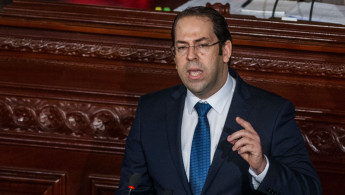'No one safe' from graft probe: Tunisian PM
The anti-corruption drive is seen as a crucial part of Tunisia's road to economic recovery, following widespread corruption and nepotism under deposed president Zine el-Abidine Ben Ali.
"I hear some people say this is just a campaign, but it's not - it is state policy... Corruption in our country is widespread," Chahed said in an interview published on Sunday by La Presse and Assabah.
"We aim to tear down the systems of corruption. The struggle against corruption will be a long-term war, a sustained policy," he said.
Saying he had acted "in harmony" with President Beji Caid Essebsi, the premier vowed that "no one will be protected in this war against corruption".
Last month, a dozen people, including businessmen, suspected smugglers and even a former security official were arrested as part of the anti-graft drive.
The prime minister dismissed accusations that the crackdown was a ruse to quell social protest movements, as some of those detained are accused of "incitement and alleged financing of the protest movement" in the south.
"It is a system that can be seen everywhere... Even social protests are exploited by this system (of corruption), and terrorists also benefit from it," Chahed said.
The anti-corruption arrests, made possible by a state of emergency in force since November 2015, have been largely welcomed.
But some say such measures do not go far enough, and that more is needed than the arrest of a few prominent figures.
Chahed rejected criticism of the use of the state of emergency to make the arrests.
"In exceptional circumstances, exceptional measures," he said, adding: "Other actions are planned in this framework... People will have to get used to them", as they have "in the fight against terrorism".
Since the 2011 revolution, Tunisia has experienced an increase in militant activity that has killed dozens of members of the security forces and 59 foreign tourists.





 Follow the Middle East's top stories in English at The New Arab on Google News
Follow the Middle East's top stories in English at The New Arab on Google News
![The UAE is widely suspected of arming the RSF militia [Getty]](/sites/default/files/styles/image_330x185/public/2024-11/GettyImages-472529908.jpg?h=69f2b9d0&itok=Yauw3YTG)
![Netanyahu furiously denounced the ICC [Getty]](/sites/default/files/styles/image_330x185/public/2024-11/GettyImages-2169352575.jpg?h=199d8c1f&itok=-vRiruf5)
![Both Hamas and the Palestinian Authority welcomed the ICC arrest warrants [Getty]](/sites/default/files/styles/image_330x185/public/2024-11/GettyImages-2178351173.jpg?h=199d8c1f&itok=TV858iVg)